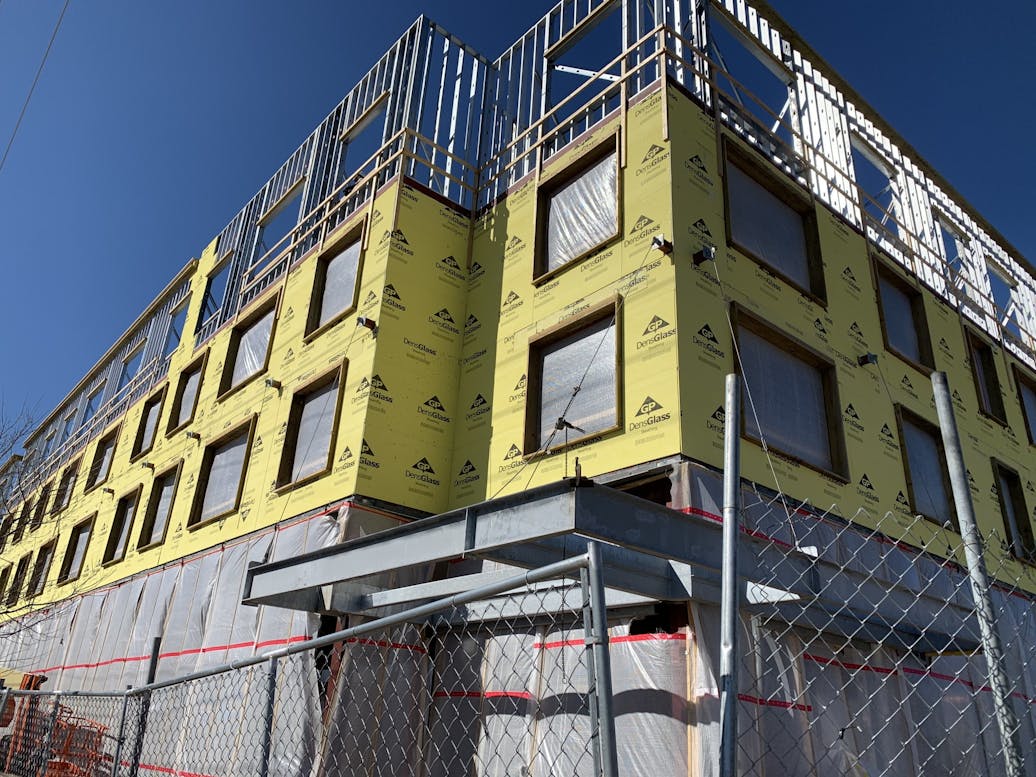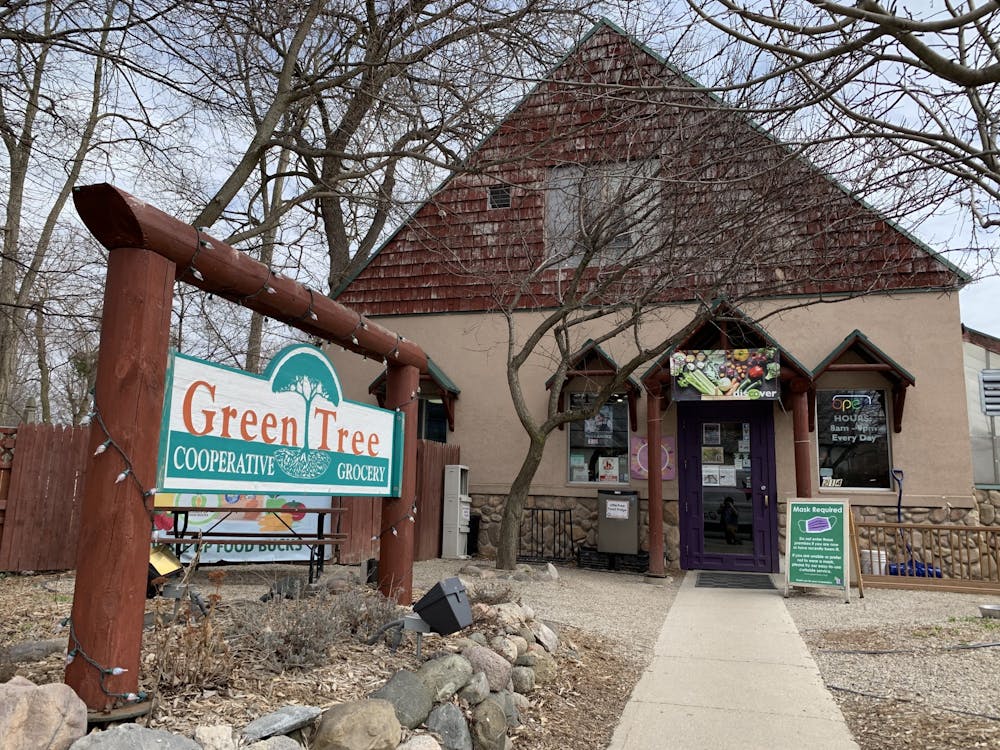SHOP TALK: Green Tree Cooperative Grocery prepares for growth
Inside the small building on the corner of N. Franklin Avenue and E. Mosher Street wafts the aroma of freshly ground coffee and spices. This hidden gem will soon move to the spotlight as it expands to a bigger building downtown.
Green Tree Grocery Cooperative is a sustainably sourced grocery store that sells organic products from local farmers and producers. A cooperative is an organization that is managed and owned by a group of people as opposed to a singular person.
More than 2,700 people own Green Tree, many of them are CMU students, many more are members of the surrounding community.
Green Tree is in the process of moving to the property known as "Parcel B" located at 410 W. Broadway. The building is slated to be complete this fall.
Business: Green Tree Cooperative Grocery
Address: 214 N Franklin St.
Phone Number: (989) 772-3221
“We’re looking forward to Green Tree’s expansion because it will provide an opportunity for them to expand their grocery offerings as well as their ready-made food which will help draw additional individuals to the downtown area and provide another resource to the westside neighborhood," City Manager Nancy Ridley said.
Central Michigan Life spoke with Marketing and Owner Services Manager Laura Coffee about the move, the store and its commitment to local sustainability.

What is Green Tree's origin story? How did the idea come about?
“Green tree was started in 1970, and my understanding is that there was a real desire for healthy natural foods and organically produced items, and they simply were not available at that time. So a group of people got together - it was community members and CMU students - and they formed a buying club where they would drive to and from Grand Rapids to pick things up from the farmers market. They eventually got together enough orders to start placing bulk orders and getting trucks delivered, and eventually got this storefront and we’ve expanded over the years from that. It was a collective effort to find and provide some products that were simply not available otherwise”
How do you compete with stores like Meijer or Walmart?
“I think we’re doing something different first of all, they’re direct competition in the sense that they are other grocery stores in the same town, but their focus is not in the same place. They have some of the products that we have now, but part of the reason that large chain stores have started carrying so many natural and organic products is because of stores like us across the country. We've shown there’s an increase in interest (for natural products).
So up until the recent past, you couldn’t get the things we have in other stores, they simply weren’t available. Us cooperatives are grouped together as part of the National Cooperative Grocers. It’s a sort-of cooperative of cooperatives. We work together nationally to work with manufacturers and to be able to have better prices and a more interesting selection that we might not be able to have on our own”
What challenges come from being a cooperative?
“One of the biggest ones is simply that we don’t have the same kind of space and resources that a large chain store has. At the same time, if one of those larger stores decides that they want to leave town they can just close their store and do that, for us we have this whole body of ownership that would have to come together and vote on something like that. So, we wouldn’t be able to sell our building and head off to Cancun unless everybody decided that they wanted money more than they wanted a co-op.
In our current building, a challenge that I don’t think any other grocery store in town has is that we have to receive deliveries of products right through the front door. We don’t have a loading dock, we don’t have a separate place for trucks to pull up, they just come right in and we carry them by hand or push them on a little hand cart and that is what it is. The other one would probably be staff sizing because we are a smaller store, we have fewer people and then we end up working with and around each other in ways that larger stores might not have to do.
How long have you been planning the move to Parcel B?
"This project has been in the works for a long time, it's hard to even remember how long at this point. Definitely more than five years we’ve been looking at that particular space. We enjoy being part of downtown and wanted to try and stay in this area if at all possible. When you’re dealing with a historic downtown there are a lot of things to consider in terms of what kind of project works well, like finding developers who are interested in the project. It took quite a while to get all our ducks in a row, do our due diligence, have our market studies done, and come up with the actual physical site plan.”
How did the opportunity come about for the Parcel B space?
“We finally found a developer who understood both what the city wanted and what we needed, and everything just came together. It was really nice to find someone who could understand what everybody was hoping to get out of the project and had experience doing this kind of thing. We’re working with a developer called Michigan Capital they’re based out of Lansing and they work with nonprofits and cooperatives and have experience doing this type of mixed-use development. So, it was simply getting to the point where everybody involved knew what they wanted, was able to work with what everybody else wanted, and had it all put together”
What’s changing as you expand and open a new location?
"We’ll be four times our current size and double the staff. Size is a big part of it. We’re going to be so much more visible. We’ve been in this location for more than 45 years and we don’t have a parking lot, we don’t have a particularly visible sign, so just being in a place where people will see us and know that we’re there. We’ll have more resources, so we’ll be able to support more local farmers… Our kitchen will be much larger we’ll be able to make so many more things on site than we currently can - and we'll have a great deli selection. We’ll have a bigger produce department which again is supporting the local farmers.(We'll have) indoor and outdoor seating. We’re just going to be able to do a lot of things that our owners and shoppers have been asking for for a long time that wasn’t possible in this building”
How are you planning on sustainably supplying a bigger store?
“We’ve had farmers adjust to increased demand for us in the past. For example, one of our local egg suppliers just went out and purchased a bunch of chickens and expanded the barn space to accommodate more chickens because we could take more eggs than they were producing, so they produced more.
We have another farmer who’s looking at purchasing some additional land adjacent to their property in order to be able to produce more. We’ve reached out to a number of additional local farmers and organic markets to be able to have more producers so were already working on increasing that in order to keep up with expected demand in the new location. We absolutely want to build a better more resilient local food system so that’s a priority for us”
Why is it important to have a store like this in Mount Pleasant?
“Having an important part of your food chain be a store that is embedded in the community is essential to having resources when something goes awry.
At the beginning of the lockdowns last March, stores were running out of things left and right. We still experience occasional out-of-stock just like everyone else, but we never completely ran out of anything because we were able to be flexible. When we couldn’t get a particular type of butter we would reach out to a different supplier that was smaller and more regional and say 'Hey can we get this from you?' Dealing with these smaller companies and smaller producers gives us more flexibility - it gives them more flexibility. We’ve got this local focus that keeps things running even when there are destructions to the larger food system.
I think that’s important for a community to have those systems in place and build that resilience in advance because you can’t just make a farm exist when you need it. You have to be supporting these things."






